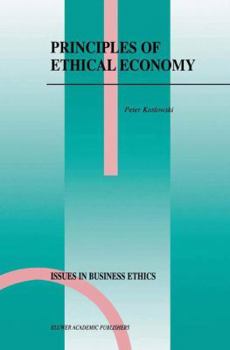Principles of Ethical Economy
Select Format
Select Condition 
Book Overview
John Maynard Keynes wrote to his grandchildren more than fifty years ago about their economic possibilities, and thus about our own: "I see us free, there- fore, to return to some of the most sure and certain principles of religion and traditional virtue - that avarice is a vice, that the exaction of usury is a misde- meanour. . . . We shall once more value ends above means and prefer the good to the useful" ("Economic Possibilities for Our Grandchildren," pp. 371-72). In the year 1930 Keynes regarded these prospects as realizable only after a time span ofone hundred years, ofwhich we have now achieved more than half. The pres- ent book does not share Keynes's view that the possibility of an integration of ethics and economics is dependent exclusively on the state of economic devel- opment, though this integration is certainly made easier by an advantageous total economic situation. The conditions of an economy that is becoming post- of ethics, cultural industrial and post-modern are favorable for the unification theory, and economics. Economic development makes a new establishment of economic ethics and a theory ofethical economy necessary. Herdecke and Hanover, October 1987 P. K. TABLE OF CONTENTS Foreword v Introduction . 0. 1. Ethical Economy and Political Economy . . 0. 1. 1. Ethical Economy as Theory ofthe Ethical Presuppositions of the Economy and Economic Ethics 3 0. 1. 2.
Format:Paperback
Language:English
ISBN:1402003641
ISBN13:9781402003646
Release Date:November 2001
Publisher:Springer
Length:283 Pages
Weight:0.93 lbs.
Dimensions:0.7" x 6.4" x 9.1"
Customer Reviews
0 rating





